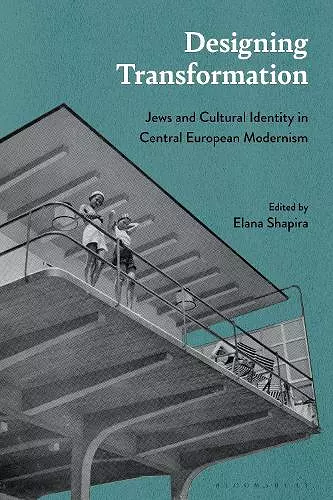Designing Transformation
Jews and Cultural Identity in Central European Modernism
Format:Hardback
Publisher:Bloomsbury Publishing PLC
Published:26th Aug '21
Should be back in stock very soon

The first book to offer a contemporary scholarly perspective on the role of Jews in shaping and coproducing Central European modernism.
Jewish designers and architects played a key role in shaping the interwar architecture of Central Europe, and in the respective countries where they settled following the Nazi's rise to power. This book explores how Jewish architects and patrons influenced and reformed the design of towns and cities through commercial buildings, urban landscaping and other material culture. It also examines how modern identities evolved in the context of migration, commercial and professional networks, and in relation to the conflict between nationalist ideologies and international aspirations in Central Europe and beyond.
Pointing to the production within cultural platforms shared by Jews and Christians, the book's research sheds new light on the importance of integrating Jews into Central European design and aesthetic history. Leading historians, curators, archivists and architects present their critical analyses further to ‘design’ the past and push forward a transformation in the historical consciousness of Central Europe. By reconsidering the seminal role of Central European émigré and exiled architects and designers in shaping today's global design cultures, this book further strengthens humanistic, progressive and pluralistic cultural trends in Europe today.
With its extensive index, bibliography, illustrations, and available formats as both a print and e-book, Designing Transformation will be a worthwhile teaching resource across Central European history, architecture and design history, cultural history, and Jewish studies. Lecturers could easily work with a selection of chapters to support studies of Jewish cultural identity and historical erasure, or Jewish cultural approaches to interwar design and architecture. Designing Transformation is hopefully one of many projects to come in a continued scholarly dialogue to revisit and excavate the lost, erased, or ignored histories of Jewish architects, designers, and patrons in the history of Central European modernism. * Art East Central *
One of the vivid threads that binds this collection together has to do with the erasures of history. Here, however we are faced with compelling evidence that in the major centers of interwar Central Europe, Jews were in the vanguard of the new urbanism and contributed to the remaking of these historical cities at an astounding level that has not yet been given the recognition it deserves. The conclusion we can draw from this is that for almost a century our understanding of European architectural modernism has been narrow, racist, and impoverished; this book is a bugle call for change. * Journal of Design History *
For anyone interested in Jewish cultural identity in Central Europe in the interwar period as well as anyone interested in Modernist architecture and style, this book is a must-read. The wealth and breadth of the contributions … bring new and refreshing revelations about the architectural landscape of urban Central Europe that was significantly influenced by Jewish architects and designers. * Journal of Austrian Studies *
Designing Transformation presents a wealth of new research on the multi-faceted involvement of Jewish architects, designers, writers and patrons in Central European Modernism. Wide ranging and thoughtfully framed, the collection demonstrates the centrality and complexity of Jewish production and co-production of the modern city, home and collective consciousness. And it offers a provocative challenge to understand and mark the importance of this contribution to the contemporary European city. -- Leslie Topp, Professor of Architectural History, Birkbeck, University of London, UK
Elana Shapira’s Designing Transformation breaks new ground in its intricate and nuanced examination of the Jewishness of Central European modernism. Its essays reveal how the negotiation of Jewish difference, visibility, and belonging, how processes of Jewish acculturation and mobility imprinted the urban landscapes of the former Habsburg empire in the interwar period and global sites of forced emigration in the 1930s and 40s. The volume encompasses a wide range of well-known and obscure figures who responded to twentieth-century crises and opportunities with artistic innovation and dazzling creativity. -- Paul Lerner, Professor of History and Director of the Max Kade Institute for Austrian-German-Swiss Studies, University of Southern California, USA
This volume offers an array of expertly-researched, insightful essays on a breathtaking number of Central European Jewish designers, architects, artisans and artists. It is a vital resource for anyone seeking to expand their knowledge of Jews’ participation in the built environment and visual culture in the modern era. -- Lisa Silverman, Associate Professor of History and Jewish Studies, University of Wisconsin-Milwaukee, USA
This important volume complicates our understanding of modernism by shedding light on a significant but overlooked period of production through the lens of identity. Rather than a single view, this lens offers multiple visions and rich, complex accounts about both known and little-known works and designers. Particularly welcome are the authors’ even-handed treatments of modernism in all its permutations from the most rigorously functionalist to those informed by tradition and folk-culture. -- Timothy M. Rohan, Associate Professor, American and European Architecture, University of Massachusetts Amherst, USA
This volume is the first to comprehensively examine the productive role of modern Jewish designers and architects in Central Europe within the horizon of emancipation, participation and dislocation. Elana Shapira has succeeded in bringing together distinguished authors from different disciplines and geographies. Designing Transformation thus formulates multiple perspectives and presents an impressive tableau of topics and approaches. -- Burcu Dogramaci, Professor of Art History, Ludwig Maximilian University of Munich, Germany
Designing Transformation marks a highly important stage in the overdue acknowledgement of Jewish architects, designers and patrons in shaping Central European Modernism. Through ground-breaking research, the collected essays offer ways to understand the diverse circumstances of Jews, how their Modernism was far from homogenous, and that their negotiation of cultural authorship was central to their status, identity and survival. -- Jeremy Aynsley, Professor of Design History, University of Brighton, UK
ISBN: 9781350172272
Dimensions: 236mm x 158mm x 22mm
Weight: 740g
344 pages